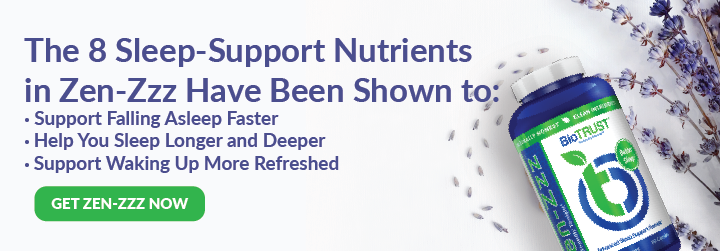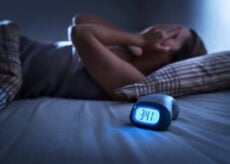Is it Time to Reconsider Your Sleep Supplement?

As we’re gearing up for the upcoming time change, many of us are ready to head to the store to grab something to help support better sleep. After all, no one has time for feeling groggy or wasted, which is all too common after springing forward. The most popular sleep supplement by far is melatonin. But you may want to reconsider your sleep supplement. Here’s why…
Melatonin: The Go-To Choice for Millions
Melatonin supplements are easy to find, inexpensive, and the go-to choice for millions. Melatonin’s popularity has increased sales by 150% in the last 10 years, stemming from its role as a natural hormone vital for regulating the sleep-wake cycle. It’s commonly used for those who regularly experience insomnia, people who are traveling, and of course, when the clocks change for Daylight Savings.
Melatonin is readily available over the counter. And many consider it a good choice as it’s a natural and safer option for helping adjust sleep schedules than medications. It’s considered safe for short-term usage at dosages from 5 mg to 50 mg. Plus, it’s inexpensive. Depending on the brand, dosage, and quality, you can pick up a bottle for around $5 to $30. So, why would you consider more expensive alternatives?
Unfortunately, melatonin can cause some unsettling side effects, especially when higher dosages are consumed. Some of the most common side effects include:
- Headaches
- Dizziness
- Nausea
- Drowsiness or grogginess the following day
- Mild anxiety
- Irritability
- Confusion or disorientation
- And abdominal discomfort
Another effect that’s been reported is more frequent and vivid dreams. It may even lead to nightmares for some individuals, especially with higher dosages and more frequent use. This effect is believed to be because melatonin influences REM sleep (when people dream). It’s also worth noting that melatonin may stay active in the body for longer in older people, and it isn’t recommended for anyone with dementia.
There are benefits of using a quality sleep supplement that contains melatonin. However, many experts recommend using the lowest effective dosage (i.e., 5 mg per day) and gaging your body’s response. It’s also important to buy from a reputable brand so you are confident in the quality and that what’s on the label is what’s in the product.
Understanding the Variable Effects of Valerian Root
Valerian root is another common sleep supplement. This herb has been used for centuries to promote deeper relaxation and sleep. Again, while it is considered safe for short-term use, especially with higher dosages, users may experience side effects like:
- Headaches
- Dizziness
- Stomach problems
- Dry mouth
- Daytime drowsiness
- Mental fogginess
- And vivid dreams or even nightmares.
Valerian root may also interact with certain medications, such as antidepressants, anticonvulsants, and sedatives (including alcohol). Again, side effects vary depending on the individual, the dosage, and how often Valerian root is used.
Should You Reconsider Your Sleep Supplement?
If you do experience side effects with melatonin or valerian or find they don’t help you sleep much better, other vitamins, minerals, and herbs may better help support a good night’s sleep with less of the concerning side effects.
- Magnesium is a well-known mineral with numerous benefits that may support sleep quality. For example, it may help regulate neurotransmitters throughout the nervous system, which help calm the body and make it easier to fall asleep. It can also bind to GABA receptors, which may help promote greater calm and relaxation and help ease stress, which is essential for a good night’s sleep. In addition, magnesium may help muscles relax and prevent cramping, which can interfere with sleep.
- Vitamin B6 is vital for maintaining overall health. Plus, it has several functions that could support sleep quality and duration. For instance, it is needed for the synthesis of serotonin, a neurotransmitter important for mood, appetite, and sleep. It may also help support the conversion of serotonin into melatonin to help regulate the sleep-wake cycles. In addition, research indicates B6 may help reduce the time it takes to fall asleep and lead to more restful sleep.
- L-theanine is an amino acid found in tea leaves (especially green tea) that’s well-known for its potential to promote relaxation. It may also support sleep quality without leading to drowsiness. L-theanine helps increase GABA, serotonin, and dopamine levels in the brain to help regulate mood. It may also promote greater relaxation to help you fall asleep more easily as well as encourage deeper, more restful sleep. Because it’s “non-sedative,” it also doesn’t lead to grogginess the next day. So not only will it not impair cognitive function or motor skills, it may enhance them, leading to better attention.
- Chamomile is well-known for its calming effects and is often included in teas that promote sleep and relaxation. These effects are usually attributed to the antioxidant apigenin, which may bind to receptors in the brain to help decrease anxiety and help you relax and sleep. Consuming chamomile has been found to help improve sleep quality, help people fall asleep faster, and wake up less during the night.
- Passionflower is another herb traditionally used to support sleep by improving how quickly you fall asleep and how deeply you sleep. It may also help lower brain activity that leads to anxiety, which may help promote better sleep.
- Lemon balm (Melissa officinalis) is an herb from the mint family revered for its calming effects. It’s been used traditionally to aid relaxation and sleep as well as for improving mood and cognitive function. Studies suggest it helps people fall asleep faster and promotes more restful, uninterrupted sleep as it helps calm the body and the mind. It’s also been found to help reduce sleep disturbances associated with menopause.
Keep in mind, the right sleep supplement might not be just one lone ingredient. Rather, you may enjoy better results by combining nutrients and herbs that work together to promote deeper, more restful sleep.
Reconsider Your Sleep Supplement for More Restful Sleep
It’s hard to adjust when sleep patterns are disturbed due to time changes, jet lag, or just a few late nights or early mornings. One way to help the body adjust can be to consider sleep aid supplements.
While melatonin and valerian are two highly popular options, they may not be the ideal solutions for everyone, especially considering the potential side effects and interactions. Fortunately, there are a variety of other natural supplements, including magnesium, vitamin B6, and L-theanine, that offer promising alternatives for those who want to improve their sleep and get back on schedule.
By understanding their benefits and potentially combining them for their complimentary effects, you can better tailor your approach to sleep. But don’t forget sleep hygiene. Creating a schedule, turning down the lights, getting warm before you cool down, and avoiding stimulants at night are all part of a personalized strategy to help you get a good night’s sleep so you can wake up feeling refreshed and ready to take on the day!





